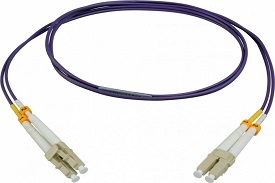
Single Mode Optical Fibre (SMF) is a type of optical fibre designed to transmit a single mode or ray of light, allowing for high-bandwidth, long-distance data transmission with minimal signal dispersion. In SMF, the core diameter is smaller than that of multimode fibres, typically around 9 micrometres. The reduced core size enables a single light mode to propagate through the fibre, minimizing modal dispersion and allowing for the transmission of signals over much longer distances without significant loss or distortion. SMF is widely used in telecommunications, data centres, and long-haul communication networks where high data rates and low signal attenuation are crucial. It is preferable for applications requiring the transmission of coherent light signals, such as in Dense Wavelength Division Multiplexing (DWDM) systems, providing the capacity for multiple high-speed data channels over a single optical fibre.
The Scheme GCS, Group C for Optical Fibre - Single Mode, is crucial in the field of telecommunications, serving as a standardized specification for the design and interoperability of single-mode optical fibres. Compliance with Group C ensures that single-mode optical fibres consistently meet performance standards, offering a standardized and interoperable solution for various applications such as internet connectivity, telephone services, and data transmission. Adherence to this scheme supports the creation of a standardized and interoperable environment for single-mode optical fibres, ensuring their compatibility and reliability across diverse network configurations in the dynamic landscape of telecommunications. The GCS Scheme, Group C, is essential for advancing the overall performance and capabilities of single-mode optical fibres in the realm of optical communication.
Note: Manufacturers of Optical Fibre - Single Mode are required to obtain the mandatory TEC Certification to sell their products in the Indian market.
For manufacturers aspiring to introduce Optical Fibre - Single Mode in India, securing TEC certification is a pivotal regulatory requirement. TEC certification ensures that these optical fibres align with specific technical standards and regulations set by the Telecommunication Engineering Centre, a key authority in India overseeing norms for telecommunication equipment. This certification process is essential for validating the optical fibres' compliance with established criteria, covering aspects such as signal transmission performance, durability, and compatibility within the Indian telecommunication landscape. By obtaining TEC certification, manufacturers not only underscore their commitment to regulatory compliance but also affirm the reliability and compatibility of their Single-Mode Optical Fibre. This certification ensures seamless integration into the Indian communication network infrastructure, setting a benchmark for quality and functionality.
The TEC Certification for Optical Fibre - Single Mode includes the following eight variants:
TEC (Telecommunication Engineering Centre) Certification is a crucial accreditation granted by the Telecommunication Engineering Centre, which operates under the Department of Telecommunications, Government of India. TEC Certification ensures that telecommunications equipment complies with the specified technical standards and legal requirements, verifying their quality, safety, and interoperability. This certification is essential for manufacturers and importers seeking to market their telecommunications products in India. Established in 1987, TEC plays a vital role in formulating and enforcing standards to enhance the efficiency and reliability of telecommunication networks and services in the country. TEC Certification is a mark of adherence to these standards, facilitating market access and assuring consumers of the reliability and compliance of the certified products with Indian telecommunications norms.
Follow the given steps to complete your TEC certification process:
Step 1: Register on the TEC Portal
Step 2: Allotment of the testing laboratory
Step 3: Submit samples for testing
For more detailed information, please click here.
The list of documents required for TEC certification is as follows:
Legal Address Proof of the Manufacturing Unit:
Trademark Details:
Technical Details About Products:
For more detailed information, please click here.
Brand Liaison provides valuable support in obtaining the TEC Certificate for your products. Our services include:
For a more in-depth understanding of the documentation and procedures involved in obtaining TEC Certification, feel free to connect with our team of experts at +91-9250056788 or +91-8130856678.